ENVIRONMENT OF RESPECT AND EMPOWERMENT
- Best Employer in Finance & Investments according to Changellenge 2021
- 58% increase in the annual average number of training hours per employee compared to 2020
- 43% of the Group’s headcount are women, which is comparable with other exchanges For more details, see the subsection “Diversity and equal opportunity” of the current section.
For 2019, 2020, and 2021 metrics, see the subsection “Environment of respect and empowerment” of the section “Sustainability Data”. For key policies, procedures, and departments, see the relevant subsection of the section “Sustainability Approaches and Procedures”.
Building a comfortable, fair, and encouraging work environment is an overriding priority of Moscow Exchange Group. Over the past several years, Moscow Exchange has put considerable efforts into building a culture of respect and trust in the workplace and increasing employee satisfaction and engagement. Today, the Group continues to take part in dynamic activities to that end.
Care for our employees has been a key focus area of Moscow Exchange throughout 2021, which is reflected in the Sustainability Roadmap. Priority areas include pursuing gender equality, encouraging a healthy work-life balance, increasing the flexibility of the working environment, and ensuring the physical and emotional well-being of staff. The Group's management seeks new approaches to developing expertise, managing the agenda, and setting ambitious and quantifiable objectives.
- SDG 4.4 Develop employees’ professional and technical skills
- SDG 4.7 Train employees to effectively manage sustainability within the Group
- SDG 5.5 Ensure gender equality in the Group
- SDG 8.5, 8.6, 8.7, 8.8 Ensure decent working conditions for employees
This subsection describes the activities and initiatives of Moscow Exchange Group as it seeks to provide good working conditions, create a safe and comfortable workplace, and uphold the basic principles of fostering a culture of development and equal opportunity. The Group places particular emphasis on training and professional development, including increasing employee awareness of sustainability issues.
2021 highlights
In 2021, Moscow Exchange Group was highly ranked in the Changellenge Best Company Award 2021, a rating of employers among the most active demographic—students and graduates of Russia’s top 30 universities:
- #1 employer in Finance & Investments;
- #34 of the top 100 companies for starting a career, according to students majoring in Business;
- a top 50 company for starting a career, according to students majoring in IT;
- one of the best employers, according to students of the Financial University and top universities of the Urals and Siberia.
Furthermore, in 2021, Oleg Vyugin, Chairman of the Moscow Exchange Supervisory Board, won “Best Independent Director”, and was also ranked third in the annual “Top 1,000 Russian Managers” rating compiled by the Russian Managers Association and Kommersant Publishing House.
102-8
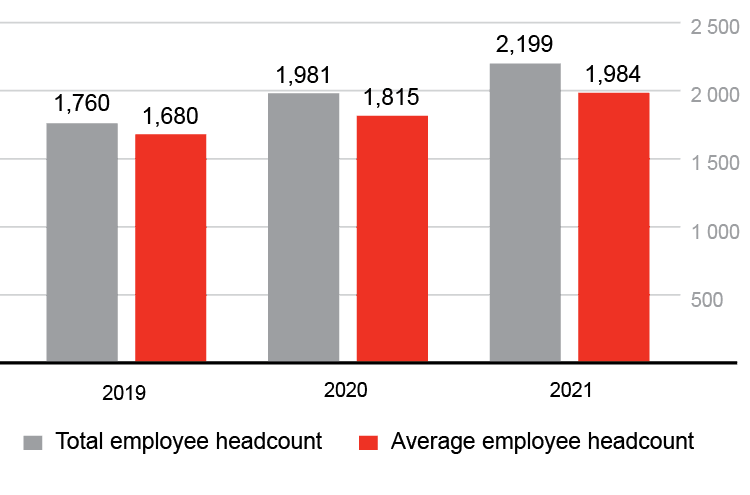
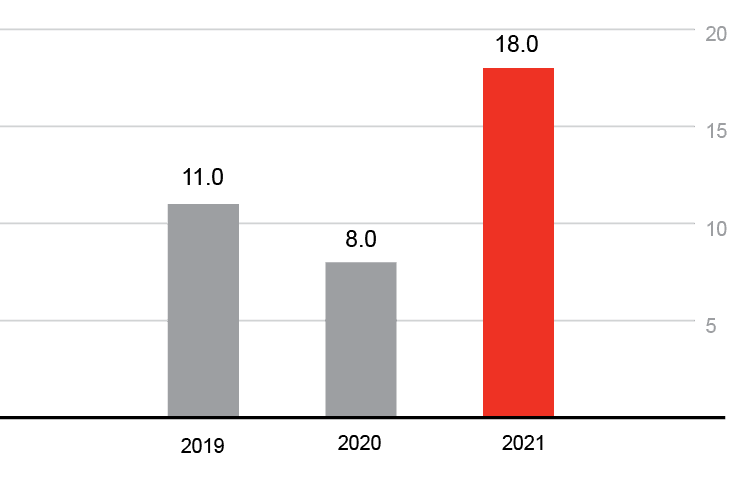
401-1
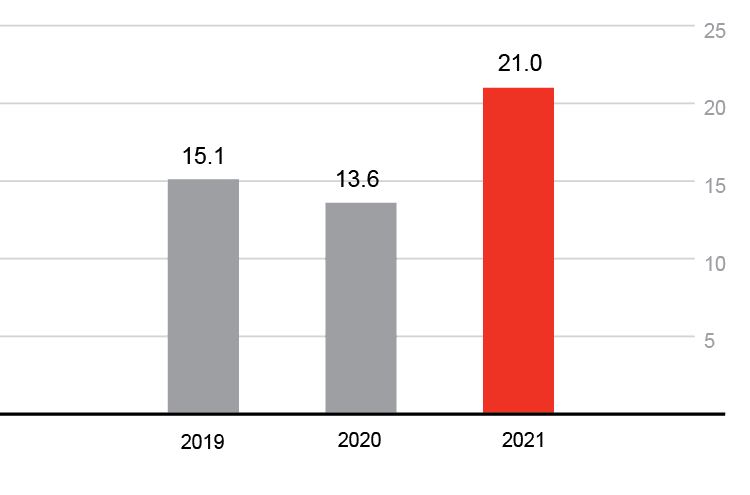
In 2021, Moscow Exchange Group launched a project to introduce HR electronic document management (EDM). The project is scheduled to be implemented in 2022.
Employee engagement and efficiency
The total employee headcount at Moscow Exchange Group increased by 11% in 2021. Employee turnover This indicator was calculated as the ratio of the number of employees who resigned voluntarily over the year to the average number of employees in the reporting year. was 18%. The growth of this indicator in 2021 can be attributed to changes in the situation surrounding the COVID-19 pandemic, which caused employee turnover to drop in 2020, only to rise again in 2021. The Group did not make any staff cuts in the reporting year or over the past three years.
After reviewing the reasons why employees quit, the Group takes appropriate steps to reduce employee turnover. To this end, Moscow Exchange monitors employee engagement. In 2020, the Supervisory Board approved a new long-term incentive program for 2023 to 2025 with a view to retaining key personnel and ensuring they are focused on the long-term development of the business of the entire Group. The Group also implements a long-term incentive program for key IT professionals, under which part of the employees’ variable remuneration consists of phantom shares Phantom shares (interests) are an incentive tool for employees, whereby the employee holds a virtual share in the company and receives dividends, but does not beneficially own the share. .
Every year, the Group conducts a comprehensive study of employee Detailed information is provided in the section “Sustainability Approaches and Procedures”. engagement. In 2021, 86% of the staff took part. Polling yielded the following results:
engagement – 86.2 %;loyalty – 81.4 %;satisfaction – 87.9 %.
Key areas of development were identified through the survey. In order to create a plan to enhance the efficiency of operations, the Group organized focus groups, identifying critical areas for employees, such as HR issues, career planning, training, remuneration, and work-life balance. Relevant activities and discussions were subsequently arranged.
Learning and development
Employees of Moscow Exchange have access to a large library of training materials.
404-2
Apart from compulsory training, the Group has prepared courses that teach hard and soft skills, and it conducts workshops on communications skills in the context of COVID-19 and the switch to remote working arrangements. A total of 954 employees took part in various educational programs or training sessions in 2021.
Due to the pandemic, most training materials are now available online. This has made training courses more accessible, allowing employees to take them at their own convenience.
- Since 2019, the Group has been successfully implementing a mentorship program to support young specialists.
- For managers responsible for hiring, training sessions are held on a regular basis to develop their skills in interviewing candidates.
- IT teams have been further integrated into the Group: in 2021, ten teams were operating in MS Teams, and ten meetings were arranged (four of which were led by invited speakers), and a page was created on the intranet. In total, there are 394 people on the IT teams of Moscow Exchange Group.
In 2021, the Group began implementing quarterly planning, which allows it to be more flexible in its response to employee requests for training. A compulsory training course for novice managers was developed, and the Group implemented a checklist of mandatory actions by managers as part of the regular management process.
Since 2020, Moscow Exchange Group has been organizing sustainable development training for employees who work in the Group’s core business areas. In 2021, it continued to offer courses on OHS, IT, anti-corruption policies and methods (including issues associated with business gifts and conflicts of interest), and risk management. The number of courses not completed by participants fell.
Diversity and equal opportunity
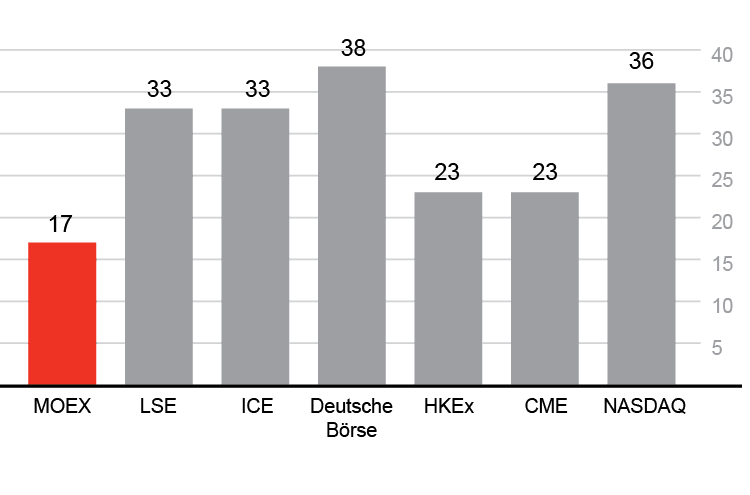
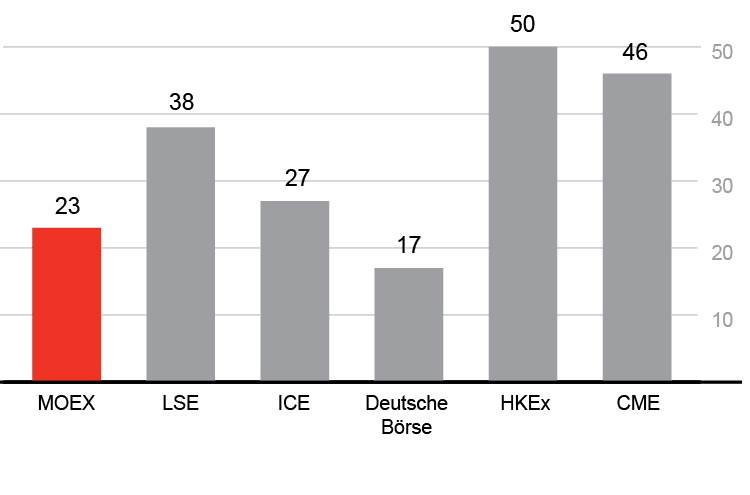
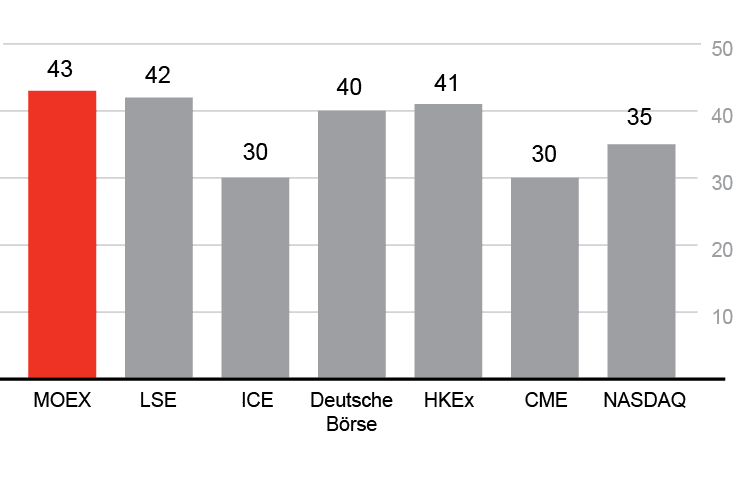
Note: LSE is the London Stock Exchange; ICE is the Intercontinental Exchange; HKEx is the Hong Kong Stock Exchange; CME is the Chicago Mercantile Exchange; NASDAQ is the National Association of Securities Dealers Automated Quotation.
Moscow Exchange Group focuses on the social and cultural diversity of its employees, providing them with equal opportunities in terms of training, career development, and social benefits. This approach leads to a more productive and comfortable work environment.
The Group follows the recommendations of the Central Bank of Russia in forming and maintaining the continuity of the Supervisory Board; including based on the principle of gender diversity.
In terms of the percentage of women among the workforce, the Group adheres to global best practices. Despite some challenges, particularly the fact that there are far fewer women in the Russian IT sector than men, the Group takes active steps to hire women in its IT departments.
202-1
Moscow Exchange Group offers competitive pay. In 2021, the average pay of entry-level specialists and workers, including bonuses, was 4.6 times higher than the minimum wage in Moscow on 1 January 2021.
In 2021, the companies of the Group started using electronic employment record books, concluding agreements on remote work, and making direct payments from the Social Insurance Fund in cases of sick leave. Due to changes in way annual performance reviews are conducted, NCC updated its Regulation on Employee Bonuses and Regulation on Corporate Social Support of Employees.
Occupational health and safety, and employee well-being
403-6 403-3
In 2021, Moscow Exchange Group strengthened its focus on preventive action to mitigate risks to employees’ health and ensure their well-being during the COVID-19 pandemic. The Group complied with all instructions issued by regulatory authorities, and also took additional steps to make working at and outside the office more comfortable. For more details, see the subsection “Overview of the COVID-19 response”.
In some circumstances, Determined on a case-by-case basis for specific employees, provided it does not contravene the relevant department's work schedule. employees may work from home This possibility was also available to employees before the COVID-19 pandemic. or under a flexible work schedule. In accordance with the Labor Code of the Russian Federation, and at an employee’s request, expectant mothers are entitled to work fewer hours, as are parents (guardians, caregivers) of children under the age of 14 or disabled children under 18 years of age, as well as employees who are helping care for a sick family member. Both women and men (at the family’s discretion) are granted leave to care for children under three years of age; mothers who go back to work ahead of time are provided breaks to feed infants younger than a year-and-a-half old; an additional four paid days off per month are given to care for a disabled child.
Although the working conditions at Moscow Exchange Group do not entail any significant risks of personal injury or occupational illness, the Group strives to maintain safe working conditions and ensure the health and well-being of its employees.
403-9 403-10
Over the past three years, no incidents of work-related injuries or illnesses were recorded at any companies of the Group. Furthermore, the Group is unaware of any incidents of work-related injuries or ill health among contractors working at its sites.
Plans for 2022
Moscow Exchange will continue its efforts to maintain decent work conditions for its employees. However, given the difficult geopolitical situation, the Group is open to the possibility of adjusting its plans, including those enshrined in the Sustainability Roadmap. Nevertheless, the Group will continue working on its main initiatives planned for 2022 and beyond by adapting them to the new circumstances; the sustainability projects that are currently underway will most likely continue. The Group’s management will spare no efforts to preserve jobs and the social programs of greatest importance to its employees.
As part of the Sustainability Roadmap, the Group has planned the following initiatives and activities:
- continue to promote and raise awareness of gender equality in Russia, adding corresponding provisions to the new version of the Moscow Exchange Social Policy, which is to be prepared in 2022;
- develop a program to promote inclusion of people with disabilities;
- continue to allow flexible work schedules;
- review emotional health issues experienced by employees and work towards potential solutions;
- assess risks of human rights violations.
The Group will also continue to raise awareness of the sustainability agenda among its employees, helping them develop their knowledge and skills in this area.
